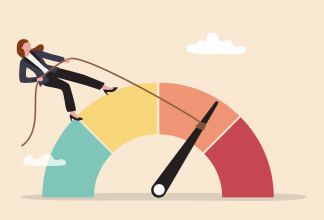Pros Pivot: Will Live Sports Work Without Fans in the Stands?
Written by Kanwal Rafiq | Published on June 19, 2020
Written by Kanwal Rafiq | Published on June 19, 2020
As live sports return to the screens, we're seeing many changes being implemented. Empty stadiums and arenas have led organizations like Germany's Bundesliga football league to experiment with fake cheers and cardboard cut-outs in the stands, while others are putting mics on players, allowing fans to hear the banter among athletes. But with COVID-19 disrupting the entire sports industry, the more-than-million dollar question is: how will live sports work without live fans?
RBC's Chief Marketing Officer, Mary DePaoli, shares her insights with host John Stackhouse on a recent episode of The 10 Minute Take podcast. DePaoli, a powerhouse in the world of golf and sports marketing, shares how some leagues have taken significant financial hits due to one of the biggest blackouts in live sports history. The sports sponsorship industry is expected to decrease this year by about 40 per cent and major North American Leagues could lose almost $12 billion in revenue. The impact has even rippled through to college sports, where American football programs generate about $4 billion in revenue, which accounts for a significant proportion of many college departments' budgets.
While some leagues are in a better position to weather the storm with their existing broadcast deals, they will still have to solve the vacuum of energy, sound and excitement of an absent live audience. Although placing mics on athletes and offering an "inside listen" of game management from coaches might be neat new features for fans, DePaoli says she's looking forward to seeing how athletes and fans adjust to these "ghost games."
But with the pandemic still in effect, one of the biggest challenges for sports teams still remains: eliminating COVID-19 transmission rates. DePaoli mentions that even without fans, this can be risky due to the hundreds of people involved in executing a single game. Leagues will have to work closely with local, national and international health officials for the safety of everyone involved.
Encouragingly, the sports world is seeing early results of fans re-engaging through live broadcasts. Germany's Bundesliga kicked it off by seeing audience growth of about six times their regular viewership, and "The Match: Champions for Charity," played by Tiger Woods, Peyton Manning, Phil Mickelson and Tom Brady, set a cable TV record for golf. According to DePaoli, this viewership is expected to grow significantly, especially as families continue to spend most of their time at home.
When looking into the future of sports economics, DePaoli emphasizes that leagues and teams will have to be more transparent by showing the value they bring to sponsors through analytics. As a result, data will be bigger than it has ever been. She suspects that some smaller North American leagues could merge or take over their European counterparts, and given the success of The Last Dance, a docu-series about Michael Jordan's basketball career, there will likely be a money shift to unscripted sports content – where there is an opportunity to turn casual fans into more active ones through behind-the-scenes stories.
To hear more insights from RBC economists and market experts, find the 10-Minute Take podcast on Apple Podcasts, Google Podcasts, Spotify or SoundCloud.
RBC Direct Investing Inc. and Royal Bank of Canada are separate corporate entities which are affiliated. RBC Direct Investing Inc. is a wholly owned subsidiary of Royal Bank of Canada and is a Member of the Canadian Investment Regulatory Organization and the Canadian Investor Protection Fund. Royal Bank of Canada and certain of its issuers are related to RBC Direct Investing Inc. RBC Direct Investing Inc. does not provide investment advice or recommendations regarding the purchase or sale of any securities. Investors are responsible for their own investment decisions. RBC Direct Investing is a business name used by RBC Direct Investing Inc. ® / ™ Trademark(s) of Royal Bank of Canada. RBC and Royal Bank are registered trademarks of Royal Bank of Canada. Used under licence.
© Royal Bank of Canada 2025.
Any information, opinions or views provided in this document, including hyperlinks to the RBC Direct Investing Inc. website or the websites of its affiliates or third parties, are for your general information only, and are not intended to provide legal, investment, financial, accounting, tax or other professional advice. While information presented is believed to be factual and current, its accuracy is not guaranteed and it should not be regarded as a complete analysis of the subjects discussed. All expressions of opinion reflect the judgment of the author(s) as of the date of publication and are subject to change. No endorsement of any third parties or their advice, opinions, information, products or services is expressly given or implied by RBC Direct Investing Inc. or its affiliates. You should consult with your advisor before taking any action based upon the information contained in this document.
Furthermore, the products, services and securities referred to in this publication are only available in Canada and other jurisdictions where they may be legally offered for sale. Information available on the RBC Direct Investing website is intended for access by residents of Canada only, and should not be accessed from any jurisdiction outside Canada.

Deciphering the jargon may help you make financial decisions in an uncertain environment.

The U.S. reciprocal tariffs announced have been large and broad-based, but critically exempt Canada and Mexico (at least for now)